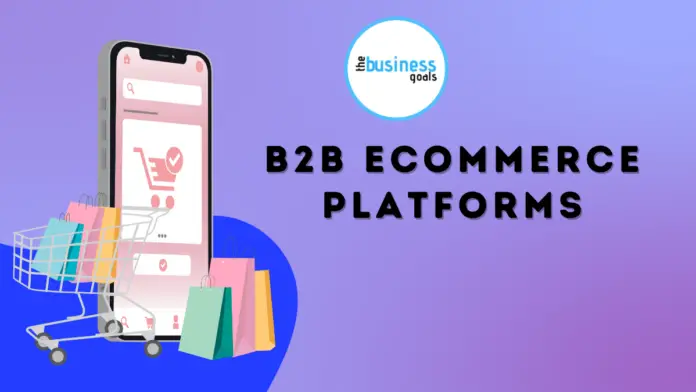As B2B companies increasingly explore the e-commerce landscape and move away from traditional brick-and-mortar stores, selecting the best B2B ecommerce software becomes critical. B2B e-commerce sites initially used as a place where existing customers can place their orders without needing a representative, have now evolved to attract new customer acquisitions.
According to a report by Forrester, B2B e-commerce in the United States is expected to reach $1.8 trillion and account for almost 20% of all B2B sales by 2023. This means that B2B e-commerce has the potential to double the size of B2C e-commerce.
If your B2B business relies mainly on brick-and-mortar stores, investing in an e-commerce platform with B2B functionality is an intelligent step to scale your business. To help you select the best e-commerce software for your B2B business right from the start, we will summarize some of the most critical features it should offer.
Key Features of B2B E-commerce Platforms:
User-friendly:
The B2B e-commerce industry has come a long way in the past decade. With the rise of digital commerce, businesses that previously operated exclusively offline have begun to prioritize e-commerce as a critical component of their business strategy.
As B2B transactions become more complex, so must the platforms facilitating them. To remain competitive, B2B e-commerce platforms offer several advanced features unavailable on consumer-facing platforms. However, it is essential to consider whether customers will still find it intuitive—if not, they will most likely switch to a company that offers an easy-to-use platform.
Restrict access option:
If you’re a B2B company, you need a platform that enables you to customize your e-commerce experience.
You want a platform that not only allows you to restrict certain pages, like bulk pricing—but also lets you do it in an intuitive way to make sure your site is as simple as possible for your clients.
Transactional options as a unified solution:
When it comes to e-commerce, you want a platform that will deliver on all your customization and order management needs.
But before you start looking at the features that are out there, you need to make sure that the tools are compatible with your current systems.
It’s important for large B2B businesses to have a unified approach for customization and managing orders because different systems can cause confusion and possible fulfillment issues.
Personalization:
User experience (UX) is no longer a luxury for B2B customers, it’s a necessity.
In the past, UX was not that crucial in the B2B sector. However, personalization is now starting to play a factor. This level of personalization is just as essential in B2B. For example, a B2B e-commerce platform with customer-specific pricing available to different customers can offer a customized experience to your clients. Also, supplier-specific catalogs can help suppliers get precisely what they need without unnecessary information. You need an intuitive platform your customers can customize for an online experience tailored to their unique requirements. For example, a solution offering customer-specific pricing and only the relevant products for a specific customer can help you deliver a more personalized experience.
Responsive design and mobile access:
To make sure your customers can shop anywhere, anytime—and on any device—your e-commerce platform must be mobile-friendly.
Mobile browsing is now the norm for B2B buyers, and they expect the ability to browse products and place orders from their smartphones or tablets. Additionally, app users should be able to use their device’s camera to scan barcodes, making it easy for them to purchase products without typing anything into their phones.
Payment options:
B2B buyers pay for orders differently from B2C customers. Selecting an e-commerce platform that offers flexible payment options, such as partial payments, is vital.
Order notes:
A good e-commerce platform should allow customers to add notes about an item or order. It should also enable sales representatives to answer questions about products, upsell additional items, and add shipping preferences.
Product catalog management and inventory availability:
Organizing your product information can be challenging, especially if your suppliers send catalogs in different formats. Look for a solution that offers robust inventory data that your customers can access. This helps prevent backorders that can be expensive.
One of the most time-consuming challenges of B2B e-commerce is managing product information from multiple suppliers. Choosing a B2B e-commerce platform with robust inventory data your customers can access will reduce potential backorders and resulting costs.
Functionality for self-service:
Your typical B2B buyer wants to be able to get information and resolve issues themselves. The best e-commerce platforms let them access shipping details, quote approvals, and order tracking.
Ability to copy previous orders:
B2B customers are much more likely to reorder frequently than B2C customers. It would be best if you made it easy for them to duplicate their past orders. The best solutions let buyers view their previous orders so that they can easily replicate them or make changes if necessary.
Other factors to consider when picking a B2B ecommerce platform:
• Your business goals and how the e-commerce platform will affect you as a company.
• Your team’s ability to use the platform efficiently.
• Identify a platform that offers the tools you expect to need as your business grows and evolves.
Final thought
Investing in the best B2B e-commerce software is a smart move to scale your business in today’s e-commerce landscape. The ideal e-commerce platform should have the essential features mentioned above and be easy for your customers and sales representatives. By considering these features, you can confidently select the best e-commerce platform that aligns with your business goals and outperforms the competition.


The content Team Writer is one of the writers from our team of content writers. The Business Goals blog is expanding day by day and we need more writers and brand ambassadors for promoting our media website. If you are interested contact your portfolio through the Write for Us page.
















































